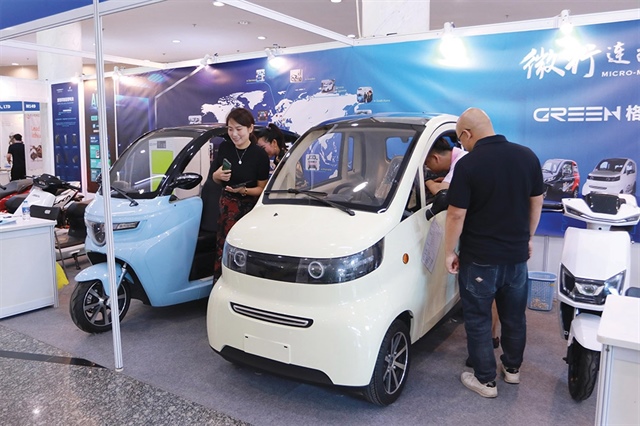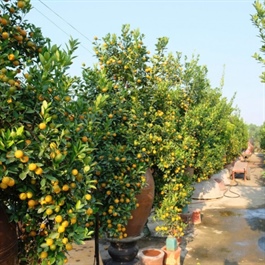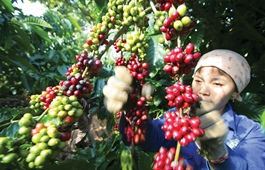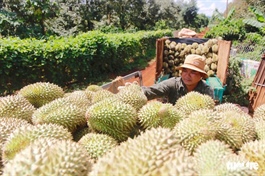Lack of charging stifles EV ambitions
Lack of charging stifles EV ambitions
More electric vehicle charging stations are being built by manufacturers and third parties in Vietnam, but the numbers are still far from meeting likely demand, and some Chinese manufacturers are leaning back into petrol or hybrid-engine cars.
Saigon Fuel JSC revealed in late December its cooperation with VinFast to survey gas stations for the installation of charging stations. If all requirements are met, the company, which currently operates 18 gas stations, will proceed with construction.

Some companies are offering more hybrid vehicles as EV charging infrastructure fails to meet demand, photo Le Toan |
A Saigon Fuel leader stated that fire safety approval is required before proceeding. Additionally, setting up charging stations takes up space, affecting sales activities and business performance, particularly at smaller stations.
“The company will consider cooperation at larger premises that meet fire safety standards,” the representative said.
Petrolimex and PV Oil have already launched hundreds of electric vehicle (EV) charging facilities at their gas stations nationwide for VinFast vehicles. At the end of November, Vingroup and PV Power signed an agreement to develop a nationwide EV charging system, with a network of 1,000 stations planned by PV Power before 2030.
Elsewhere, Centre Mall Vo Van Kiet in Ho Chi Minh City’s District 6, which will soon open, will feature two areas for charging EVs and motorbikes.
Two charging stations, each with four ports offering fast charging speeds of 60KW for VinFast EVs, are being built by Saigon Trading Group in collaboration with V-Green. Additionally, there is a 120KW superfast charging station from partner Eboost for other EVs.
The EV charging station business also creates new opportunities for businesses and individuals as greener vehicles become popular. In September, VinFast introduced franchise charging stations with a fixed revenue-sharing rate for franchise partners, applicable for a minimum of 10 years. Within just over a month, VinFast received nearly 1,000 applications to open franchise charging stations.
In the market, major enterprises have already joined VinFast’s franchise model. For instance, Vasia JSC has deployed 30 franchise charging points in the northern province of Bac Ninh, while Fast+ Charging Station JSC signed a cooperation agreement to install 5,000 stations nationwide at shopping centres, residential areas, public car parks, and highway rest stops.
Nguyen Phi Long, director of Fast+ Charging Station, said, “Investing in and developing charging stations is not only a good business opportunity but also contributes to promoting green transportation and supporting the government’s net-zero commitments.”
Exponential growth
In response to rising demand, restaurants, hotels, resorts, and shopping malls are investing in EV charge stations. Some e-car users have reportedly cancelled trips or avoided destinations and services lacking charging facilities.
An Dinh Nha, general director of GG Charging JSC, said the company offered various models, including franchise, joint investment, and self-funding by individuals and companies.
“Recently, many clients such as supermarkets, shopping malls, restaurants, and office buildings have expressed interest in investing in charging stations for both customers and employees,” he said. “We are proactively seeking suitable premises in crowded areas to install small-scale charging stations with low investment costs and quick capital recovery.”
Nguyen Hung Thuong, CEO of Solar Z Energy Investment JSC, which installs charging stations for restaurants, hotels, resorts, and highway rest stops, said demand was surging from foreign investment funds, domestic companies with technological expertise, and individual investors.
“The demand for installing EV charging stations this year has doubled compared to last year and is expected to grow even more next year. Recently, a client commissioned my company to install a chain of over 70 charging points, while another restaurant and hotel system has completed nearly 20 charging points,” he said.
The charging station market will become more dynamic in the coming years as more electric trucks, buses, and containers enter operation. The tax exemption and reduction roadmap under trade agreements is also improving EV affordability and boosting purchasing power, Thuong added.
Chinese EVs cannot wait
According to a report by market research firm Counterpoint Research in mid-2024, Vietnam has experienced impressive growth in this area, with battery EV sales increasing more than four-fold and contributing nearly 17 per cent of Southeast Asia’s regional sales. But most of them are VinFast models, while the Chinese EV wave seems to be slowing down in Vietnam due to lack of charging stations.
In recent years, users have had more choice as EV models distributed in Vietnam are increasingly made available, with a variety of types, segments, and prices that have already been launched on the market.
In addition to VinFast, Chinese companies like Wuling, BYD, and GAC Aion have also entered the market with several models. BYD is the Chinese company selling the most EVs in Vietnam, with six models. According to Chinese vehicle info service Yiche, this was the third best-selling brand globally at one point last year, only trailing behind Volkswagen and Toyota.
Wuling, distributed by TMT Motors, introduced its Mini EV model into Vietnam in 2023. It has been the world’s best-selling mini EV since 2020. However, it has not been able to make a breakthrough in Vietnam.
“Although the manufacturer did not announce sales figures, the business situation of this brand at dealerships has not shown signs of improvement. The main obstacle for BYD and Chinese EVs is the lack of a public charging station system,” said Truong Thanh Long, a Wuling salesperson.
In Vietnam, VinFast is the only EV manufacturer to have developed a public charging station system that covers almost the entire country, and its continuing development is not being shared with other brands. Some third-party units such as EV One, Evercharge, and Eboost have built charging stations, but very few.
“The disadvantage of this is that Chinese EV owners and non-VinFast users have to charge their vehicles at home. However, not all users have parking space at home to charge, especially in big cities with high housing density, and many small alleys,” Long said.
Against these challenges, Chinese car manufacturers are leaning towards offering more petrol or hybrid cars in the Vietnamese market soon. A raft of new Chinese car models are set to enter Vietnam to welcome the new year. However, very few of them are to be battery EVs, with hybrid and petrol-engine cars still making up a larger proportion.
Of the four models being launched in the Vietnamese market this month alone, DongFeng Motor will dedicate two models to EVs, and the others to petrol and hybrid vehicles.
Meanwhile, the Jaecoo J7 with a plug-in hybrid engine is expected to be launched in Vietnam in mid-January, the MG G50 will be on sale in at least two versions, both of which are petrol-run, and Haval Jolion will announce the selling price in early 2025 of its Pro and Ultra hybrids.
GWM’s Tank 300 will also be introduced in early 2025, with both a petrol and hybrid version.
The petrol-engine Omoda C5 arrived in Vietnam last month, although previously, the manufacturer said that the first products in Vietnam would include a pure electric version of the C5.

























